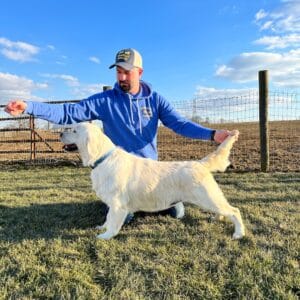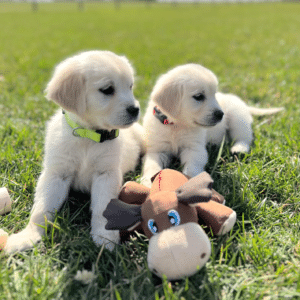The first time I watched a well-socialized Golden Retriever confidently navigate a busy farmers market, calmly greeting strangers and ignoring startling noises, I was reminded of why proper socialization matters so deeply. That confident adult dog wasn’t born that way, their temperament was certainly a gift of good breeding, but their comfort in the world came from thoughtful early experiences.
Socialization is more than just exposing your puppy to various experiences. It’s a deliberate process of introducing your Golden Retriever puppy to the world in a way that builds confidence and creates positive associations. The experiences your puppy has during their critical socialization period (roughly 8-16 weeks of age) will shape their behavior and reactions for life.
This guide will walk you through everything you need to know about socializing your Golden Retriever puppy, with special attention to the unique needs and temperament of these wonderful dogs.
Understanding the Science of Puppy Socialization
Your puppy’s brain during the socialization period is uniquely receptive to new experiences. Neural pathways are forming rapidly, and the emotional responses your puppy develops to new stimuli during this time become deeply ingrained. Think of it as programming your puppy’s default settings, it’s much easier to create positive associations now than to modify fear responses later.
Many new owners misunderstand socialization as simply exposing their puppy to as many things as possible. However, quality matters more than quantity. A single overwhelming experience can create lasting fear, while gradual, positive exposure builds lasting confidence.
Golden Retrievers may experience “fear periods” during development, temporary phases where they seem suddenly wary of familiar things. These typically occur around 8-10 weeks and again around 6-14 months. During these periods, continue gentle exposure to familiar situations while being especially careful to keep experiences positive.
The Essential Socialization Checklist
People Socialization
Golden Retrievers are naturally people-oriented, but they still need positive exposure to diverse humans. Aim to introduce your puppy to:
- People of different ages, from babies to elderly
- People of various ethnic backgrounds
- People wearing hats, sunglasses, uniforms, and bulky clothing
- People using canes, wheelchairs, or other mobility aids
- People with beards, unusual hairstyles, or different body types
We encourage our Rockvale families to keep a jar of treats by the door so visitors can offer a friendly greeting. Remember that your puppy doesn’t need to interact with everyone—sometimes observing from a comfortable distance is enough, especially with very young puppies.
Animal Socialization
While dog-dog socialization is essential, it needs careful management:
- Arrange playdates with known, vaccinated, well-mannered dogs
- Seek puppy socialization classes run by qualified trainers
- Gradually introduce your puppy to other household pets
- Allow safe observation of livestock or wildlife from appropriate distances
Golden Retrievers typically enjoy canine companionship, but they need to learn appropriate play styles and greeting behaviors to ensure a harmonious relationship. Watch for reciprocal play with breaks and mutual enjoyment rather than one puppy overwhelmed by another.
Environmental Experiences
Your Golden will encounter countless environments throughout their life. Early positive exposure helps them adapt confidently:
- Different walking surfaces—grass, concrete, metal grates, wood floors, gravel
- Various water experiences—puddles, kiddie pools, streams, lakes
- Stairs, elevators, and different types of doorways
- Rural settings with natural elements and urban environments with bustle
- Car rides, starting with short, positive trips to enjoyable destinations
European Golden Retrievers often show particular sensitivity to environmental changes, making gradual, positive exposure especially important for establishing confidence.
Sounds and Stimuli
Sound sensitivity can develop easily without proper socialization:
- Household appliances—vacuum cleaners, blenders, washing machines
- Outdoor equipment—lawn mowers, leaf blowers, construction sounds
- Weather-related sounds—thunder, heavy rain, wind
- Celebration noises—fireworks, party poppers, balloons popping
Begin with recorded sounds at low volumes during positive activities like mealtime or play. Gradually increase volume while monitoring your puppy’s comfort level. Never force exposure if your puppy shows fear.
Creating Positive Socialization Experiences
The quality of socialization experiences matters far more than quantity. A few guidelines to ensure positive encounters:
First, learn to read your puppy’s body language. Signs of stress include lip licking, yawning, whale eye (showing whites of eyes), pinned-back ears, tucked tail, or freezing. If you see these signs, create more distance or end the exposure and try again later with less intensity.
Always pair new experiences with high-value rewards. This creates a positive emotional association with novel situations. For Golden Retrievers, who are typically food-motivated, special treats are effective, but praise and play can also serve as equally effective rewards.
Allow recovery time between new experiences. Puppies, like children, can become overwhelmed by too much stimulation. A good rule of thumb is to balance each new experience with familiar, comfortable activities.
Remember that habituation, or gradual exposure, works better than flooding, or forced exposure. If your puppy seems concerned about something new, don’t push them to “face their fears.” Instead, increase the distance until they’re comfortable, then gradually decrease it over multiple sessions.
Age-Appropriate Socialization Timeline
8-10 Weeks: Foundation Experiences
When your Rockvale puppy first comes home, focus on building trust and introducing basic household experiences. This includes:
- Family handling and gentle restraint
- Different household surfaces and areas
- Everyday household sounds
- Basic grooming introduction
- Car rides and crate training
Keep experiences brief, positive, and followed by rest. Your puppy is adjusting to their new home, and quality bonding time creates the secure base from which they’ll explore the wider world.
10-12 Weeks: Expanding the Comfort Zone
As your puppy’s confidence grows, gradually expand their world:
- Short trips to quiet public places
- Controlled meetings with friendly, vaccinated dogs
- Introduction to various weather conditions
- More challenging surfaces and obstacles
- Different handling by various family members
This is a wonderful age for building positive associations with new experiences. Golden Retriever puppies are typically eager and resilient during this period, but still monitor for signs of stress.
12-16 Weeks: Building Confidence with Novelty
This is often when puppies become more aware of potential threats, making positive experiences particularly important:
- Puppy classes with qualified trainers
- Brief visits to more stimulating environments
- Introduction to water (especially important for water-loving Golden Retrievers)
- More diverse human interactions
- Novel sounds and sights
Remember that your puppy’s immune system is still developing, so choose controlled environments and avoid areas heavily trafficked by unknown dogs until vaccination series are complete.
4-6 Months: Reinforcing Through Adolescence
As your puppy enters adolescence, continue socialization while managing their increasing energy:
- Basic training in different environments
- More challenging social situations with proper management
- Expanded duration of experiences
- Introduction to various recreational activities
- Continued positive exposure during potential fear periods
Golden Retrievers often experience a phase of increased confidence followed by wariness during this period. Maintain consistent, positive exposure while setting clear boundaries.
6-12 Months: Advanced Socialization Challenges
Your adolescent puppy now needs more complex socialization:
- Practicing focus on distractions
- Encountering more challenging situations with support
- More varied recreational activities
- Strengthening responses to everyday stimuli
- Developing reliability in various settings
Adolescent Golden Retrievers may test boundaries during this period. Maintain consistent expectations while ensuring a positive experience.
Special Considerations for Golden Retrievers
Golden Retrievers have breed-specific tendencies that deserve special attention during socialization:
Their natural friendliness needs to be channeled into appropriate greetings. Many Goldens become overly excited when meeting new people or dogs, which can lead to jumping or mouthy behavior. Teach them that calm behavior earns attention and interaction.
Water introduction should be a key focus, as most Golden Retrievers have a natural affinity for swimming. Begin with shallow, warm water and positive experiences, never forcing your puppy to swim. A Golden who develops confidence in water early typically becomes a joyful swimmer for life.
Retrieving games provide excellent socialization opportunities unique to this breed. Use retrieves as rewards during exposure to new environments, building positive associations with novel situations through their natural retrieving instinct.
European Golden Retrievers often exhibit slightly different socialization needs compared to American lines. Their typically calmer temperament can make them less overwhelmed by new experiences, but their sensitivity may require more attention to making experiences positive rather than neutral.
The Rockvale Socialization Advantage
At Rockvale Puppies, socialization begins long before our puppies are adopted by their families. Our puppies experience thoughtful exposure to different surfaces, sounds, handling techniques, and gentle challenges from their earliest weeks. This early neurological stimulation gives them a significant advantage in adapting to their new homes.
Our socialization program includes:
- Early neurological stimulation exercises
- Exposure to household sounds and environments
- Careful introduction to different handling techniques
- Age-appropriate novel experiences
- Foundation training for confident puppies
This head start means your Rockvale puppy comes home with curiosity and resilience already established. Our families report that their puppies adjust more quickly and confidently to new experiences compared to puppies from other sources.
We provide ongoing support for all our families, including socialization guidance specific to your puppy’s temperament and your living situation. Our goal is to set both you and your puppy up for a lifetime of confident companionship.
Ready to welcome a well-socialized European Golden Retriever puppy into your family? Contact Rockvale Puppies today to learn about our upcoming litters and socialization program. We’re committed to raising confident puppies who grow into adaptable, resilient adult dogs, the kind who happily join you for every adventure life brings.
Remember, socialization isn’t just about creating a well-behaved puppy, it’s about giving your Golden Retriever the gift of lifelong confidence in our sometimes unpredictable world.




